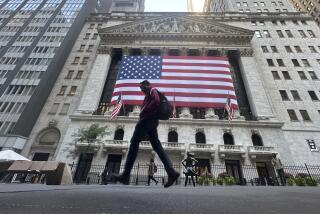Merging Before the Music Stops
Forget about the button-down world of pin-striped suits and conservative ties: The recent spate of mergers among investment firms shows that Wall Street is caught up in a feeding frenzy that belies its staid self-image.
Wednesday’s announcement that Chase Manhattan Corp. is acquiring J.P. Morgan & Co. marks the fourth such blockbuster deal in two months--with more expected.
Though analysts say the mergers generally make sense on paper in an era when critical mass is key in many industries, they also wonder whether Wall Street is coming late to its own party.
The factors driving the consolidation--such as the desire for global clout--have been in place for several years.
But the deals are coming now primarily because financial firms are suddenly worried about being left behind once the merger dance is done.
With each combination, a potential buyer and seller are removed from the pool of firms with which the remaining players can do a deal.
“The herd mentality is very much prevalent on Wall Street in terms of consolidation,” said Michael Flanagan, an independent securities analyst in Philadelphia. “We’re seeing premium prices being paid simply for the right to compete. There is no assurance of success for some of these deals.”
In the last two months, Swiss banking giant UBS agreed to buy U.S. brokerage PaineWebber Group; Credit Suisse Group, another Swiss titan, snapped up investment banking firm Donaldson, Lufkin & Jenrette; and Wall Street’s leading investment bank, Goldman Sachs Group, decided to buy Spear, Leeds & Kellogg, a major middleman in stock trading.
With each deal, prices of the remaining franchises have soared, forcing buyers to pay significantly higher prices than they would have just three or six months ago. For example, by Monday, the day before rumors of a Chase buyout swamped Wall Street, J.P. Morgan had surged to about $170 from $110 in July.
Nevertheless, analysts say it’s hard to argue with financial firms paying up to boost their product lines and asset size.
Many firms are seeking the heft to compete on a global scale. The ability to, say, handle in-house a corporate client’s European bond sale as well as its U.S. equity offering is far more desirable than farming out one of the duties to a rival firm.
Another factor behind the deals is a sudden desire by some financial giants to beef up their so-called market-making units. These highly profitable operations trade stocks on behalf of clients as well as for the firms themselves, and will play a central role in the evolving structure of the U.S. stock market.
Indeed, shares of Knight Trading Group surged Wednesday on speculation that Nasdaq’s largest market maker may be acquired. Its shares rocketed 23%, up $6.63 to $36.06, after the firm’s chief executive canceled a long-planned speech. Tuesday, J.P. Morgan’s chairman called off a speech at the same conference in advance of his firm’s buyout.
Inherent in some deals--such as UBS-PaineWebber--is the desire of firms to gain greater access to individual investors’ assets and trading, as small investors have become a major market force since the mid-1990s.
The deal pace also has quickened because of regulatory changes allowing banking, brokerage and insurance firms onto more of each other’s turf. What’s more, some long-independent financial companies have only recently agreed to sell themselves, said Jeff Morris, manager of the Invesco Financial Services fund.
For years, for example, PaineWebber said publicly that it wasn’t interested in merging. But sensing that the time was right--and that it might not fetch as high a price if the stock market were to tumble later this year or early next year--the company agreed to be courted by UBS, analysts said.
Although the prices paid in this year’s deal wave are relatively high, they’re not unreasonable if the mergers work out, analysts said. “We’re not at a level where we’re seeing deals left and right that don’t make sense,” said Anna Dopkin, co-manager of the T. Rowe Price Financial Services fund in Baltimore.
Still, there is universal agreement that some of these financial mega-deals will simply flop. It’s impossible to say which combinations won’t work. But blending disparate corporate cultures and attaining new efficiencies can be tough. Yet many financial giants no doubt believe they can duplicate the success of Citigroup, the banking leader that also is huge in insurance (Travelers) and brokerage (Salomon Smith Barney).
Some analysts are asking another question related to the stock market overall: Does the fact that more brokerages and investment bankers are selling themselves now point to an end--or at least a pause--in the 10-year-old bull market?
In other industries, such as entertainment, foreign firms paid hefty prices for U.S. properties only to realize later that they had gotten in at the tail end of an upturn. Some eventually sold out at a loss.
Market optimists note, however, that plenty of financial deals preceded the current wave. Morgan Stanley bought Dean Witter in 1997 to form Morgan Stanley Dean Witter, for example.
“There have been events all along the way that felt momentous at that time, and life went on,” said David Berry, an analyst at Keefe, Bruyette & Woods in New York.
*
MERGER DEAL
Chase Manhattan makes a bid for J.P. Morgan with offer of $35.6 billion. C4
(BEGIN TEXT OF INFOBOX / INFOGRAPHIC)
Feeding Frenzy on Wall Street
The planned merger of Chase Manhattan Corp. and J.P. Morgan & Co. is just the latest in a recent wave of deals involving large U.S. financial firms. Speculation about more deals has driven shares of brokerages sky-high this year. Monthly closes and latest for three of them:
*
Morgan Stanley Dean Witter
* Ticker symbol: MWD
* Current market capitalization: $118 billion
* Estimated 2000 earnings per share: $5.06
Wednesday:
$104.50,
down $3.44
*
Merrill Lynch
* Ticker symbol: MER
* Current market capitalization: $55 billion
* Estimated 2000 earnings per share: $7.80
*
Wednesday:
$68.81,
down $2.69
*
Lehman Bros.
* Ticker symbol: LEH
* Current market capitalization: $18 billion
* Estimated 2000 earnings per share: $11.15
Wednesday:
$149.38,
down $9.13
Source: Bloomberg News
Merger Advisors: The Leaders
Here are the top 12 Wall Street investment banks, ranked by the value of U.S. merger deals in which each firm has served as an advisor to an acquiring or target company this year.
*--*
Value of deals Number Firm advised (billions) of deals Goldman Sachs $581 161 Morgan Stanley Dean Witter 474 142 Merrill Lynch 431 113 Salomon Smith Barney 352 129 Wasserstein Perella 261 22 Credit Suisse First Boston 214 129 Donaldson, Lufkin & Jenrette 172 155 Chase Manhattan 117 93 UBS Warburg 113 37 Banc of America Securities 86 54 J.P. Morgan 78 64 Lehman Bros. 73 91
*--*
Source: Thomson Financial Securities Data
More to Read
Inside the business of entertainment
The Wide Shot brings you news, analysis and insights on everything from streaming wars to production — and what it all means for the future.
You may occasionally receive promotional content from the Los Angeles Times.










